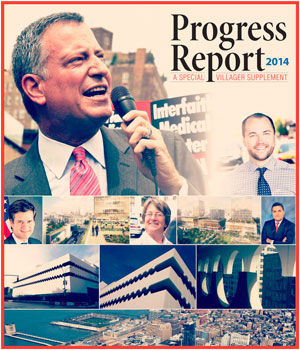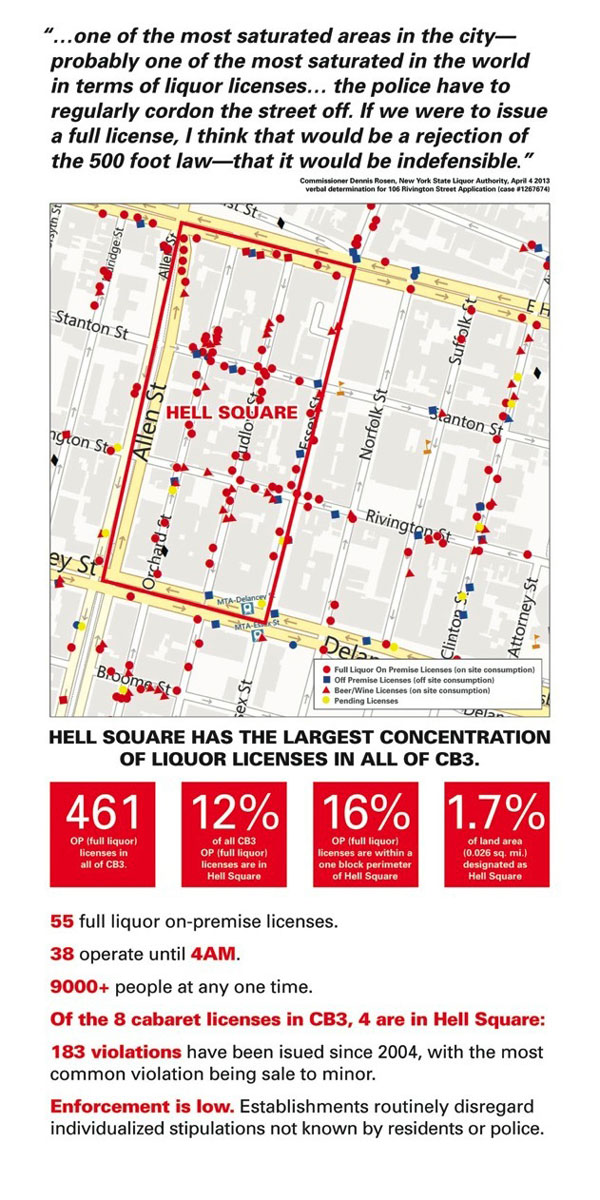 BY DIEM BOYD | As an organization, we believe that livable and diverse neighborhoods emerge and are sustained long term through an informed and empowered community. We are proud of our efforts that have brought those who were once active stakeholders back into the process, and have welcomed new people to claim a stake in their community. A strong city needs strong communities working toward common goals, and this is what we have been building on the Lower East Side.
BY DIEM BOYD | As an organization, we believe that livable and diverse neighborhoods emerge and are sustained long term through an informed and empowered community. We are proud of our efforts that have brought those who were once active stakeholders back into the process, and have welcomed new people to claim a stake in their community. A strong city needs strong communities working toward common goals, and this is what we have been building on the Lower East Side.
Revitalizing the Lower East Side also means partnering with other communities and organizations that share our common ethos. We share collective experiences and expertise with our neighbors in Hell’s Kitchen, the Meatpacking District, Harlem, Inwood, Flatiron and across the Williamsburg Bridge. The mutually supportive relationships we continue to foster with our extended neighbors allow for the sharing of vital information and resources as we fight on multiple fronts to protect our neighborhoods and quality of life.
The broad concerns we face as a neighborhood are the same concerns shared by all neighborhoods in all five boroughs. It’s this common purpose that led us to become actively involved from its inception with the Downtown Action Coalition (D.A.C.), a diverse group of 31 community organizations spanning Lower Manhattan from east to west, unified in response to the often drastic and unwelcome transformation of our neighborhoods.
COMMUNITY

In the Lower East Side, we envision a future in which the entrenched blight of liquor license oversaturation, especially at the hands of negligent operators, is a distant memory. In the past year alone, L.E.S. Dwellers directly addressed more than 50 liquor applications in our tiny area of the Lower East Side, already the most liquor license-saturated neighborhood in the entire city. There were many hard-fought battles that brought much-needed attention — not just at the community level, but also at the local, city and state government levels — to the relentless decimation of our quality of life, plus the public health and safety issues that have resulted from the nightlife free-for-all that we face as a community. These battles have catalyzed a forgotten, disheartened and resigned community into action, paving a way for long-overdue, significant change.
With 51 liquor licenses within 500 feet in any direction of the center of Hell Square, our nine small blocks already contain 17 times the legal amount. Twelve percent of all liquor licenses in Community Board 3 are concentrated in this area that represents only 1.7 percent of the entire district. We have worked tirelessly to curb the increase of that number, and are beginning to see the results as liquor license applications and approvals drop precipitously. On average, we were faced with as many as 11 license applications in any given month. As of February 2014, we are down to four.
The steep decline in both applications and approved licenses can be attributed to a three-pronged strategy of organizing and empowering community stakeholders against liquor license expansion; pushing for denials from C.B. 3; and community advocacy at both the State Liquor Authority 500-foot hearings and full board hearings.
Advocating on behalf of our community, we have impressed upon the S.L.A. the statutory considerations of the Alcoholic Beverage Control Law’s Section 64(6-a), which imposes a “public interest” standard for on-premise applications. This has resulted in the S.L.A. siding with us the majority of the time, concluding that applicants will need to meet an extremely high “public interest” threshold to be granted a license. The Authority further confirmed that our area is not underserved for alcohol, with the attendant conditions and problems created by high alcohol-outlet density unlikely to change anytime soon.
Additionally, despite Ludlow House being granted a “club” liquor license, the prohibiting of alcohol on the exposed section of the rooftop and limiting its hours from 9 a.m. to 6 p.m. has set a critical precedent for the licensing of outdoor spaces in close proximity to residents. This is one of many victories for a community overburdened by more than 60 venues with open windows, rooftops, backyards and sidewalk tables and counters.
We will continue to fight against the increase of liquor licenses in our neighborhood and continue to press the S.L.A. to take negligent operators to task. The reporting of nonconforming and noncompliant businesses operating outside of ABC Law and local and state laws and regulations will be ratcheted up from our efforts last year, as we continue to expand our objectives to include real-time action and solutions.
We will also continue to partner with business owners on initiatives to improve residents’ quality of life and opportunities for responsible business. Hotel Chantelle was one such partner in relaying the neighborhood’s message that SantaCon is a disrespectful and disruptive event for both residents and local businesses. Just recently, The Meatball Shop has become an integral asset for the neighborhood by organizing a monthly sit-down for local restaurateurs to address both resident and business concerns. We believe these working partnerships are the right step toward developing mutual solutions to the common objectives we face as we try to revitalize and protect the Lower East Side for residents and businesses, so that we all can flourish.
With liquor license applications decreasing in our area, we are broadening our focus to include initiatives around enforcement. We believe it is essential that residents play a role in identifying the conditions that give rise to public safety issues, such as crime and social disorder. Equally important is that residents collaborate on the solutions. This is why we are pushing for more-proactive, community-oriented policing for our area. When communities under duress are able to establish trust in and develop close working ties with their local police precinct, solutions that are responsive to the real needs of the community emerge. This interdependent and vital relationship restores social order, safety and quality of life to beleaguered communities, fosters mutual respect between all community stakeholders, and encourages sound, stable and diverse economic growth.
Finally, near the end of last year, we found ourselves briefly distracted by the controversy that ensued after being suspended as a community group for three months by our local community board. This incident only strengthened our resolve, renewing our commitment to ensuring that all community stakeholders are represented in a manner that encourages citizen involvement and empowerment, enhances public trust, and promotes open, transparent dialogue and information sharing.
Despite this unwarranted distraction, we stayed the course, encouraged by the support we received from our elected officials throughout the year. Assembly Speaker Silver, state Senator Squadron, former Borough President Stringer and Councilwoman Chin stood alongside their constituents when it mattered most. They have been positive examples how government can work, and at times eagerly, to help solve our problems.
And now with new leadership at the city’s helm, we are more hopeful than ever that the needs of local residents in this embattled neighborhood will be made a priority after years of neglect. This is why we are pushing forward with a clear vision for our community: widening our focus to proactively seek solutions, not just highlight the problems, working toward creating a community where people feel proud, protected, secure and happy with the quality of life to which they are entitled.
We are far from our goal, but we are on the right track. We are making progress. Slower than we would like, yes, but progress, nonetheless. Life abounds with daily distractions, fresh challenges and new hurdles, but we are making lasting positive change, together.
Boyd is founder, LES Dwellers (www.lesdwellers.org)



































